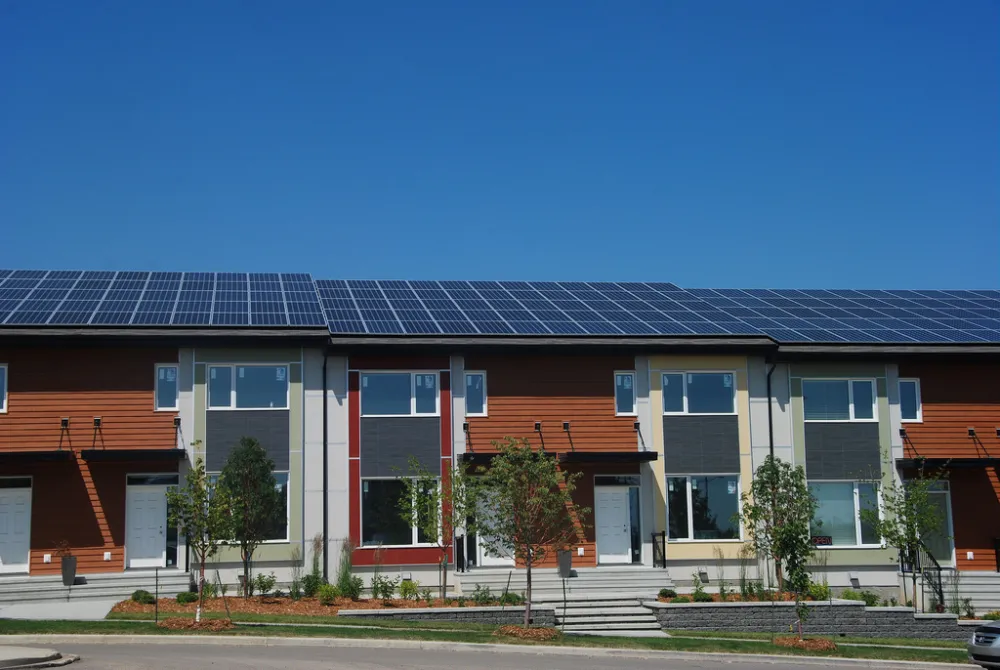VANCOUVER, TORONTO, and OTTAWA — Leading building and energy professionals are urging the federal government to prioritize swift action to make Canada’s homes and buildings ultra energy-efficient and low-carbon in discussions between federal, provincial, and territorial energy ministers. For the first time since the adoption of the Pan-Canadian Framework on Clean Growth and Climate Change, Canada’s energy and mines ministers are gathering for their annual meeting in St. Andrews, New Brunswick.
Today, 10 organizations released a letter to Minister of Natural Resources Jim Carr and Minister of Environment and Climate Change Catherine McKenna. It urges the rapid and complete implementation of the building-sector commitments set out in the Pan-Canadian Framework. Eight months after its adoption, it’s time for concrete timelines and commitments to fulfill the plan’s goals.
To improve energy efficiency, reduce energy costs, and create green jobs, the coalition encourages these key federal actions:
- Drive momentum toward “net-zero energy ready” new construction
- Accelerate retrofits and emissions reductions in existing buildings
- Improve energy-efficiency standards for appliances
- Catalyze private investment in energy efficiency through strategic use of public funds
- Lead by example with public buildings
Specific recommendations include: setting a clear expectation for provinces that all new construction should be net-zero energy ready by 2030, supporting provinces in requiring mandatory home energy labelling at time of listing, developing a comprehensive strategy for existing buildings, and requiring new publicly owned buildings to be built to net-zero energy ready standards as of this year.
The Pembina Institute, The Atmospheric Fund, and Canadian Energy Efficiency Alliance initiated the letter. Its signatories include Architecture Canada, Équiterre, and MaRS Advanced Energy Centre.
Quick facts
- Energy use in homes and buildings accounts for nearly a quarter of Canada’s carbon pollution.
- An energy-efficient home can lower energy bills by up to 50%.
- There are nearly 300,000 jobs in Canada’s green building sector.
- A “net-zero energy ready” building is so efficient it could generate the amount of energy it uses on an annual basis with on-site renewable energy.
Quotes
“The Pan-Canadian Framework provided the ambition, and now we need to see action and accountability. Moving to an ultra energy-efficient, low-carbon building sector is a win-win for Canadians: when energy efficiency in our homes and buildings goes up, our carbon pollution and utility bills will go down.”
— Karen Tam Wu, director of the Buildings and Urban Solutions Program, Pembina Institute
“The federal government can make good on its Pan-Canadian Framework commitments to decarbonize the building sector with a game plan of specific policies, programs, and milestones. Action to improve the energy efficiency of buildings will pay off through healthier, more comfortable, and affordable homes and workplaces.”
— Julia Langer, CEO, The Atmospheric Fund
“Some of the lowest cost, most rapidly achievable reductions in greenhouse-gas emissions are found in the building sector. We hope the ministers who are gathering over these few days will seize this once-in-a-generation opportunity to transform Canada’s built environment and reap the many benefits of ultra energy efficiency.”
— Elizabeth McDonald, president and CEO, Canadian Energy Efficiency Alliance
[30]
Download the letter to Ministers Carr and McKenna: Time for Canada to lead the way to ultra energy-efficient buildings
Contact
Stephen Hui
Communications Lead, Pembina Institute
778-987-7654
stephenh@pembina.org
Tw: @StephenHui
Background
Infographic: The many benefits of energy efficient homes and buildings
Op-ed: Constructing our future with low-carbon buildings
Open letter: Canada needs a bold national action plan for energy efficient buildings
Report: Deep Emissions Reduction in the Existing Building Stock
About us
The Pembina Institute is a non-profit think-tank that advocates for strong, effective policies to support Canada’s clean energy transition. We have offices in Vancouver, Calgary, Edmonton, Toronto, and Ottawa.
The Atmospheric Fund invests in urban low-carbon solutions in the Greater Toronto and Hamilton Area to reduce carbon emissions and air pollution. TAF is supported by dedicated endowment funds provided by the City of Toronto and the Province of Ontario.
The Canadian Energy Efficiency Alliance is the country’s leading independent advocate promoting the economic and environmental benefits of energy efficiency. CEEA’s members include large international corporations, Canadian utilities, and a wide variety of energy efficiency associations.







